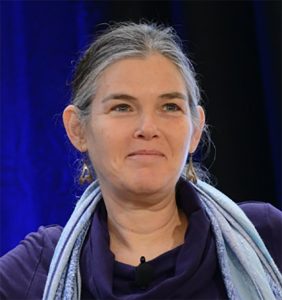
With healthy ($500 million plus) financing and major deals with pharma and Genomics England, insitro is one of the standouts of AI in drug discovery and development. Koller’s goal is simple: to revolutionize drug discovery and development. It’s a straightforward problem, she explains: “If you can reduce the probability of failure from 95–90%, you’ve doubled productivity.”
Not trained as a biologist, machine learning specialist Koller was drawn to drug discovery and development because it was more technological and aspirational than “telling spam from non-spam.” Koller has a PhD in computer science, was a Stanford professor for almost 20 years, and was co-founder and co-CEO of online learning site Corsera, among other endeavors.
[ Click the lower right icon to view fullscreen with transcript ^ ]
Human health became her passion though, and in 2018 she founded insitro, which combines induced pluripotent stem cells (iPSCs), genome editing, high content cellular phenotyping, machine learning, and other data-generating tools to build in vitro models of disease to be maximally predictive of human clinical outcomes.
Now, the company is applying that platform to data from partners like Genomics England, which has almost 150,000 whole genomes with corresponding phenotypic data from rare disease patients and their families. Genomics England also has multimodal and high-dimensional data, including histopathology images from its cohort of cancer patients.
In the final part of this second series of Front Row, Malorye Branca interviews Koller to learn about Advancing AI in Rare Disease and Cancer.

Comments are closed.